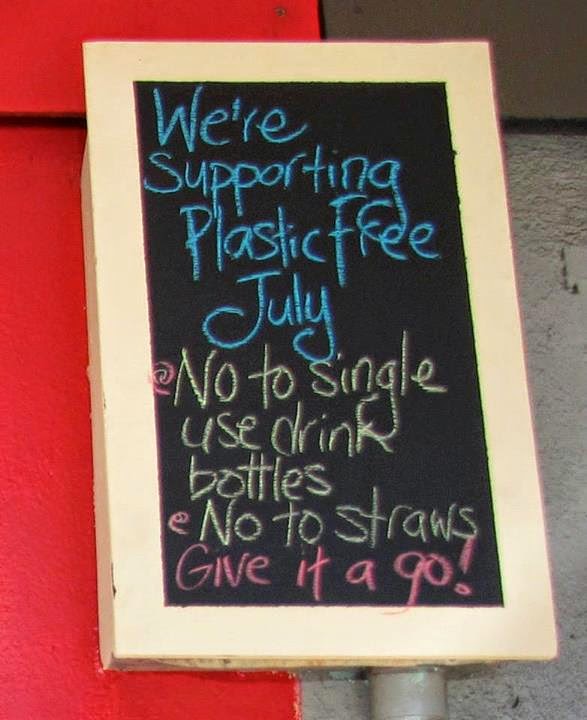From Plasticfreejuly.org
Can You Go Plastic Free July?
Special thanks to Kathleen at Roseprairiequilts for posting this! I hadn't heard of it. Here's the idea-
try to not use any single-use plastic item for the month. How would you do that? I buy a lot of thing bulks, but then what do you do with the plastic bags? We use them for kitty box cleaning, so dual use :) What could you do? Please post ideas if you have them??? Here's just a few ideas from their website- Plasticfreejuly Living Plastic Free :
Plastic Free Food Storage-
Choose glass or stainless steel food storage containers.
Wrap sandwiches in fabric or place in paper bags.
Use what you have.
Save your glass jars and bottles for purchasing bulk food and for storing leftovers.
Store leftovers in a bowl with plate over the top instead of using plastic wrap.
If you have plastic containers in the cupboard - use them.
Store vegetables in reused plastic bags, wrapped in damp tea towels or glass pyrex container.
Herbs keep well in a slightly damp tea towel in a glass container.
Wrap cheese in an old linen tea towel.
Freeze leftovers in heat stable glass containers like pyrex.
Use a clean shower cap to cover a bowl.
Line rubbish bin with several layers of newspaper.
Make your own fabric bowl covers.
Top Tips: At the Shops
Ask the butcher / deli / fishmonger to wrap meats straight in paper if you don't have your own containers.
Buy fresh bread in paper bags (if you don't have your own bread bag).
Buy fresh vegetables (some stores and co-ops deliver boxes of fruit and veggies).
Buy nuts, dried fruit, flour, legumes, coffee, rice, oats etc from bulk bins.
Choose items in glass.
Choose wine with natural corks.
Give up chewing gum (read about plastic in chewing gum at My Plastic Life).
Shop at your local farmers market.
Consider buying commonly used items such as oats, flour and rice in bulk and share with friends (bag sizes usually range in size from 5-25 kg and come in calico or reinforced paper bags).
Plastic-Free Cleaning, Make Your Own-
There is really no need to purchase ‘wonder’ pre-packaged cleaning products. Try making your own with products you can buy in bulk, and usually in cardboard. You've probably got all the ingredients in your cupboard.
All purpose cleaner: Fill an old spray bottle with vinegar and water. 1 part vinegar to 3 parts water.
All purpose disinfectant: Fill an old spray bottle with 3 cups of hot water, 3 teaspoons of borax and 10 drops of eucalyptus, lemon or lavender oil.
Clean a burnt fry pan: Fill pan with a layer of water, add 1 cup of vinegar, bring to boil. Remove from heat and add 2 tablespoons of baking soda (note: it will fizz). Empty the pan and scoure.
Clean microwaves: Combine 1/4 cup of vinegar and 1 cup water in a microwavable container. Boil mixture for 3 mins. Let it stand in microwave for 10 mins. Wipe inside of microwave with a damp cloth.
Clean mirrors: Pour a little vinegar onto a scrunched up sheet of newspaper and wipe mirror. Dry with a clean sheet of newspaper.
Clean toilets: Sprinkle bicarb / baking soda into the bowl. Rinse with vinegar and scrub.
Cleaning rags: Instead of buying cleaning rags wrapped in plastic recycle old towels, flannels and sheets that are well passed their used-by date. Cut them up, use, then wash!
Descale your kettle: Half fill the kettle with water, drop a couple of slices of lemon and boil. Repeat once. Dry with a cloth.
Fabric softener: Add one cup of white vinegar during the rinse cycle.
Make your drinking glasses shine: Soak in a solution of vinegar and water. Dry with a cloth.
Remove rust (from tins): Rub with a peeled potato dipped in bicarb / baking soda or salt.
Remove rust (from cutlery): Polish cutlery with a paste of bicarb / baking soda and vinegar.
Remove soap scum from a shower screen (1): Fill an old spray bottle with vinegar and spay the screen. Leave for 3-5 mins then wipe with a clean towel, scrubbing lightly.
Remove soap scum from a shower screen (2): For stubborn screen stains squeeze some homemade toothpaste onto a sponge and scrub.
Soak and whiten nappies: Dissolve 1/4 cup of bicarb / baking soda in warm water. Soak overnight. Wash nappies as normal.
Unblock a drain: Pour 1/3 cup of bicarb / baking soda into drain followed by 1 cup of white vinegar. Immediately seal the drain with the plug. Leave 1 hour and pour boiling water down the drain.
Washing dishes by hand: Add 4 tbs of baking soda to the hot water.
Washing dishes in dishwasher: Mix 1 cup borax, 1 cup bicarb / baking soda and 1/2 cup salt. Add 1 tablespoon of the mixture in the "soap/tablet" compartment. Add 1 tablespoon of vinegar to the "rinse agent" compartment.
Purchase Plastic Free Cleaning Products-If you are in a hurry and need to buy ready-made cleaning products look out for: Sponges sold without any plastic packaging. Soap nuts for the washing machine.
Line your bin with newspaper- Instead of using plastic bags in your bins, line them with newspaper. Check out Treadingmyownpath for a step-by-step guide to lining your bin with newspaper.



5 comments:
I saw that on her blog. I also realize that the pectin I use for jam making is in a plastic container. I do take it to recycling. Every brand of orange juice we buy comes in a plastic bottle too (we can't grow citrus here). Hmmm?
You can buy frozen juice in a paper container...
Great post. Glad I could share something that is so important for us all to consider. And thank for your sweet comments. I think grandkids are our reward for living through raising their parents.
Thanks to you!
Thanks to you!
Post a Comment